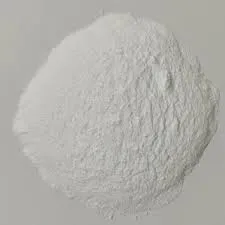The Significance of Cumene Sulfonate in Industrial Applications
Cumene sulfonate, a versatile organic compound derived from cumene, is gaining prominence across various industrial sectors due to its unique chemical properties and wide range of applications. Classified as an aromatic sulfonate, it exhibits excellent surfactant properties, making it an invaluable component in numerous formulations. This article explores the significance of cumene sulfonate, its production methods, key applications, and its role in sustainability.
Production of Cumene Sulfonate
Cumene sulfonate is synthesized through the sulfonation of cumene, which is primarily produced via the alkylation of benzene with propylene. This reaction typically occurs in the presence of an acid catalyst, resulting in cumene. The subsequent sulfonation process involves the reaction of cumene with sulfur trioxide, yielding cumene sulfonic acid, which can be neutralized to form the corresponding sulfonate salt.
The production process requires careful temperature control and reaction conditions to ensure high yields and purity. The reaction is generally performed in a two-phase system, allowing for easy separation of the final product. The resulting cumene sulfonate can be in the form of liquid or solid, depending on the formulation and the presence of other additives.
Applications of Cumene Sulfonate
Cumene sulfonate serves a myriad of applications across different industries, primarily due to its surfactant and wetting agent properties. One of the most significant applications is in the formulation of cleaning products. Its ability to reduce surface tension allows for the effective removal of dirt and grease, making it an essential ingredient in household and industrial cleaners, detergents, and soaps.
In the agricultural sector, cumene sulfonate is employed as an adjuvant in pesticide formulations
. It enhances the spreading and adhesion of pesticides on plant surfaces, improving their effectiveness. Additionally, its biodegradable nature makes it an environmentally friendly choice for agricultural applications, aligning with the increasing demand for sustainable farming practices.cumene sulfonate

The oil and gas industry also benefits from cumene sulfonate, where it is utilized as a surfactant in enhanced oil recovery (EOR) processes. By reducing interfacial tension, it improves the mobility of oil within reservoirs, aiding in the extraction of crude oil. This application plays a crucial role in maximizing resource recovery and optimizing production efficiency.
Moreover, cumene sulfonate's role in the coatings and paints industry cannot be overlooked. It acts as a dispersing agent, enhancing pigment stability and improving the overall quality of paints. By allowing for better application and adhesion, it contributes to the longevity and durability of coatings.
Environmental Considerations and Sustainability
In recent years, the focus on sustainable practices has prompted industries to seek environmentally benign alternatives. Cumene sulfonate, being biodegradable and less toxic than many traditional surfactants, aligns well with sustainability goals. Its use can help reduce the environmental impact of various products, from cleaning agents to agricultural pesticides.
Furthermore, as industries strive to minimize their carbon footprint, the production processes involving cumene sulfonate are being optimized. Advancements in catalyst technology and reaction conditions are aimed at reducing energy consumption and waste generation during its synthesis.
Conclusion
In conclusion, cumene sulfonate stands out as a vital chemical in various industrial applications, thanks to its desirable surfactant properties. Its role in cleaning products, agriculture, oil recovery, and coatings illustrates its versatility and importance across different sectors. As sustainability becomes a central theme in industry practices, cumene sulfonate's biodegradability and lower environmental impact position it as a critical component in the transition towards greener alternatives. As research and development continue to advance, further innovations regarding cumene sulfonate applications may pave the way for even broader utilization in the future.

